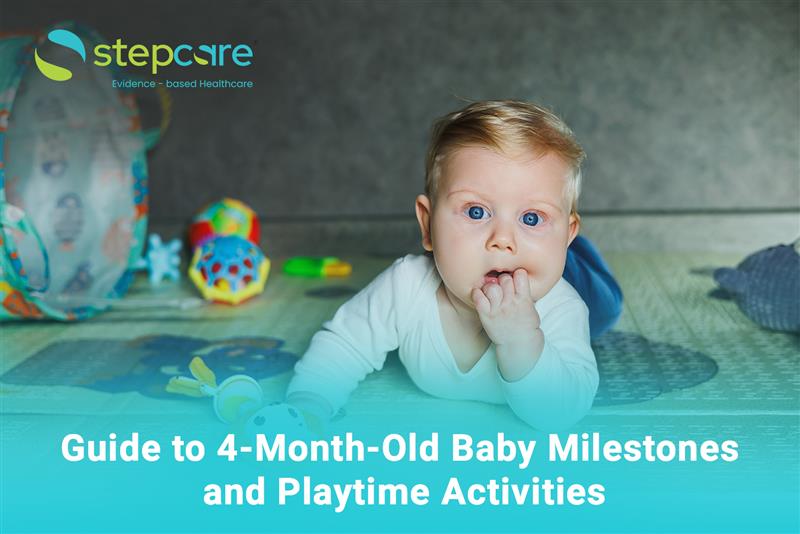- Stepcare’s mission is to help you achieve optimal health and well-being, not just for your benefit but for ours too - because we believe that a healthy you is a win-win situation for both you and Stepcare

Stepcare delivers personalised, evidence-based, and preventative healthcare that prioritises patient well-being and promotes healthier living.
G-01, Ground floor, Brigade IRV Center, Nallurhalli, Whitefield, Bengaluru, Karnataka, 560066
Subscribe for newsletter

Reaching the 4-month mark is an exciting stage in your baby’s journey! Around this age, your baby is no longer a tiny newborn but an active little explorer, eager to connect and discover the world around them. This stage is full of exciting 4-month-old baby milestones, from stronger head control to more social smiles. And remember, every baby has their own pace. Some may roll over earlier, others may babble later, and both are perfectly okay.
By four months, your baby is gaining more control over their body, and the joy of movement really begins to show:
Parent Tip: Because babies spend a lot of time on their backs for safe sleep, make tummy and side play part of the daily routine. It strengthens muscles and helps prevent flat spots on the head. Rolling over often begins around this stage, so keep a close watch when your baby is playing on the floor.
Four months is when your baby’s personality really starts to shine:
Parent Tip: Talking to your baby throughout the day helps them learn about rhythm, tone, and conversation. Narrate what you’re doing (“I’m putting on your socks now”), sing simple rhymes, and copy their coos to keep the “conversation” going.
These little exchanges help build the foundation for language.
Not sure how to play with a 4-month-old baby? You don’t need fancy toys or gadgets to help your baby grow. The best play happens when you’re down at their level, face-to-face, and engaged. Try these fun and simple 4-month-old baby activities:
Tummy time is one of the most valuable 4-month-old baby activities for this age:
Your baby may not like it right away, but with patience and encouragement, they often warm up to it, and you will love seeing how much stronger they get each day.
It’s natural to feel anxious about your baby’s progress, but remember, there’s a wide range of normal. Still, it’s a good idea to check in with your pediatrician or health visitor if, by around 4 months, your baby:
Early support can make a big difference, so don’t hesitate to reach out if you have concerns.
Final Thought: Your 4-month-old is busy learning every single day—through touch, sound, and the joy of being close to you. The best way to support their development is through love, play, and interaction. Your smiles, words, and cuddles are the most powerful “toys” they need right now.
Authored with content written by Dr. Debarati Das.



